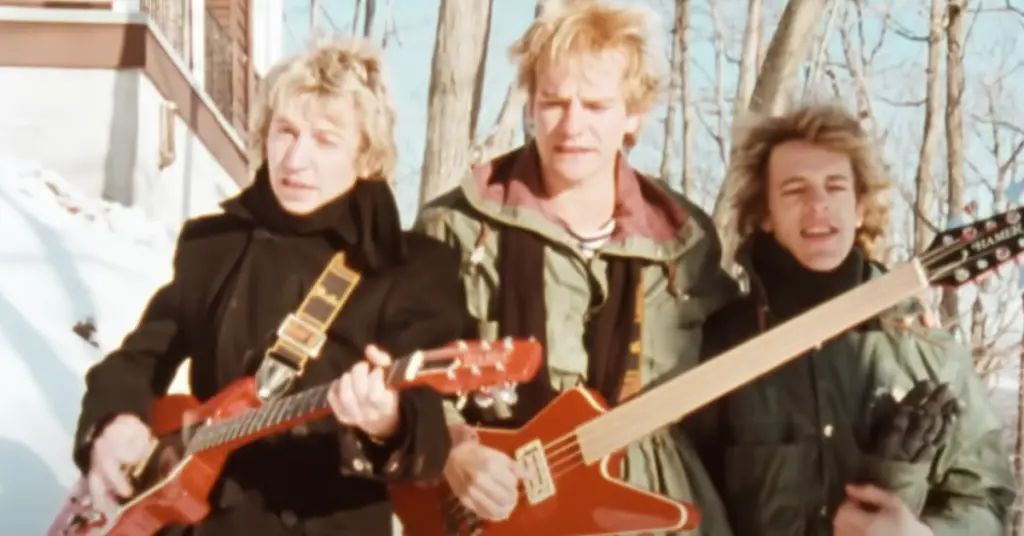The Police – “De Do Do Do, De Da Da Da”: Nonsense with a Sharp Edge
Released in 1980 as the second single from The Police’s third studio album, Zenyatta Mondatta, “De Do Do Do, De Da Da Da” is one of the band’s most instantly recognizable tracks — thanks largely to its quirky title and catchy hook. At first glance, it may seem like little more than a fun, bouncy pop song built around gibberish lyrics. But like much of Sting’s songwriting, there’s more here than meets the ear.
With its tight groove, singable chorus, and unexpected lyrical depth, the song became one of The Police’s biggest international hits — and an ironic commentary on how easily style can overshadow substance.
The Sound: Polished Pop with a Caribbean Lilt
By the time of Zenyatta Mondatta, The Police had fully developed their signature blend of new wave, reggae, and punk. “De Do Do Do, De Da Da Da” is no exception. Musically, it’s:
- Rhythmically tight, with Stewart Copeland’s precise, energetic drumming
- Built around Andy Summers’ jangly, syncopated guitar lines
- Driven by a clean, melodic bass line from Sting, anchoring the groove
- Layered with polished production, helping make the song one of the most accessible in the band’s catalog
Though it lacks the harder edges of songs like “Next to You” or “Synchronicity II,” the track’s effortless pop appeal helped it climb the charts — and endure across decades of FM radio.
The Lyrics: Childlike Sounds, Adult Frustrations
“De do do do, de da da da / Is all I want to say to you…”
At first, the lyrics seem almost absurd — even Sting admitted that the phrase was inspired by the gibberish young children use when first trying to communicate. But dig deeper, and the song reveals a critique of media, language, and political manipulation.
“Poets, priests, and politicians / Have words to thank for their positions…”
Here, Sting is expressing skepticism toward rhetoric and language used to manipulate. He’s pointing out that people often hide behind complex or emotionally loaded language — and that sometimes, simple nonsense is more honest than empty eloquence.
Ironically, the song itself became a victim of its own message — widely interpreted as lightweight due to its chorus, despite the intelligent commentary hidden beneath the surface.
Sting’s Take: Pop With a Purpose
In interviews, Sting has said that “De Do Do Do” was about the abuse of words and the desire to escape from it. He deliberately used nonsense syllables as the centerpiece of the song to make a point about communication and misunderstanding.
“The song is about banality, about the abuse of words… all that ‘de do do do, de da da da’ business is just meaningless, but that’s the point.”
It’s clever songwriting masquerading as fluff — and that duality is exactly what makes it so interesting.
Chart Performance and Reception
Upon its release, “De Do Do Do, De Da Da Da” was a major commercial success:
- Reached #10 on the Billboard Hot 100
- Climbed to #5 on the UK Singles Chart
- Became a top-10 hit in multiple countries, including Canada, Ireland, and Australia
- Helped solidify Zenyatta Mondatta as one of The Police’s biggest albums
Though some critics initially dismissed the track as novelty pop, many have since come to appreciate its deceptive depth and tightly crafted structure.
Legacy: Nonsense That Still Speaks Volumes
“De Do Do Do, De Da Da Da” remains one of The Police’s most recognizable tracks — a song that still sparks sing-alongs and debates in equal measure. It’s often cited as a classic example of how a hook can overshadow a message, and how pop music can be both playful and subversive.
It’s also a snapshot of The Police at their creative peak: balancing complexity and simplicity, message and melody, brains and bounce.
Final Thoughts
“De Do Do Do, De Da Da Da” might be easy to hum, but it’s far from empty. It’s a sly, satirical, and surprisingly cerebral piece of pop-rock that calls out the way we use — and abuse — language, even while inviting us to dance along without overthinking it.
It’s the sound of a band that knew how to make us think while making us move.
And yes, sometimes nonsense says more than words ever could.



Facebook Comments